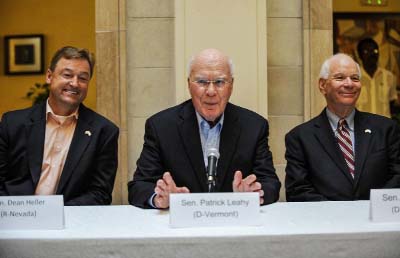
AFP, Havana :
A trio of US senators visiting Cuba’s capital on Saturday called for the reopening of full embassies in Havana and Washington, under the recent US-Cuban diplomatic thaw.
After over five decades of Cold War bad blood, President Raul Castro and US President Barack Obama in December agreed to normalize relations, and the two leaders held ground-breaking talks on the sidelines of an April summit in Panama.
“We must open an embassy, a full embassy. We had full embassies years ago,” said Patrick Leahy, a Vermont Democrat, joined by colleagues Ben Cardin, a Maryland Democrat and Dean Heller, a Nevada Republican.
“Some in the congress oppose opening it,” Leahy said. “I like to say that they are very much in the minority.”
Leahy, a frequent visitor to Cuba in recent years, said Obama has been chipping away at restrictions on US travel to the Communist-run island, and that he expected regularly scheduled commercial flights would not be far off.
At the moment, there are only regularly operating charters; and the comprehensive US sanctions on Cuba remain in place. Legally, they can only be removed by the Republican-led US Congress.
“When the president is right I support him, and the president is right in this case,” Heller said.
“One of the reasons it’s important to have a full mission for the United States in Cuba is it can represent American interest in Cuba,” Cardin added.
The United States and Cuba, which have had only diplomatic Interest Sections for years, have met several times on the full embassy issue. It is believed they could reopen as early as this month.
The White House sees better relations with Cuba as correcting an out-of-date policy and as a likely signature foreign policy achievement of Obama’s presidency.
Just last month the United States dropped the only Communist-run country in the Americas from its black list of state sponsors of terrorism, removing yet another hurdle to normalization of ties.
A trio of US senators visiting Cuba’s capital on Saturday called for the reopening of full embassies in Havana and Washington, under the recent US-Cuban diplomatic thaw.
After over five decades of Cold War bad blood, President Raul Castro and US President Barack Obama in December agreed to normalize relations, and the two leaders held ground-breaking talks on the sidelines of an April summit in Panama.
“We must open an embassy, a full embassy. We had full embassies years ago,” said Patrick Leahy, a Vermont Democrat, joined by colleagues Ben Cardin, a Maryland Democrat and Dean Heller, a Nevada Republican.
“Some in the congress oppose opening it,” Leahy said. “I like to say that they are very much in the minority.”
Leahy, a frequent visitor to Cuba in recent years, said Obama has been chipping away at restrictions on US travel to the Communist-run island, and that he expected regularly scheduled commercial flights would not be far off.
At the moment, there are only regularly operating charters; and the comprehensive US sanctions on Cuba remain in place. Legally, they can only be removed by the Republican-led US Congress.
“When the president is right I support him, and the president is right in this case,” Heller said.
“One of the reasons it’s important to have a full mission for the United States in Cuba is it can represent American interest in Cuba,” Cardin added.
The United States and Cuba, which have had only diplomatic Interest Sections for years, have met several times on the full embassy issue. It is believed they could reopen as early as this month.
The White House sees better relations with Cuba as correcting an out-of-date policy and as a likely signature foreign policy achievement of Obama’s presidency.
Just last month the United States dropped the only Communist-run country in the Americas from its black list of state sponsors of terrorism, removing yet another hurdle to normalization of ties.

